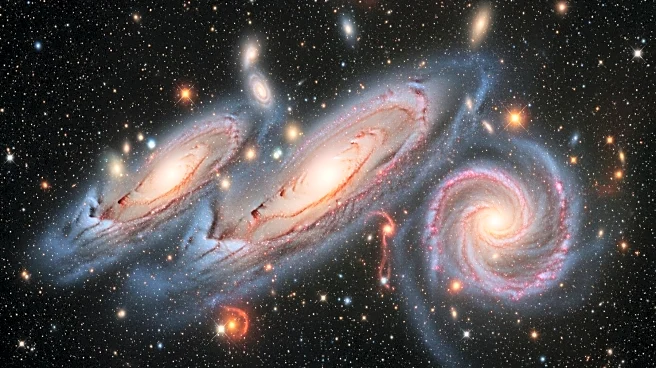What's Happening?
The James Webb Space Telescope (JWST) has provided new insights into the early universe by examining over 250 young galaxies with its Near Infrared Camera (NIRCam). The study, published in the Monthly
Notices of the Royal Astronomical Society, reveals that these galaxies were in a turbulent phase of their evolutionary history, characterized by 'messy kinematics.' Unlike the stable, rotating disks seen in mature galaxies like the Milky Way, these early galaxies were undergoing intense star formation and gravitational instabilities due to high amounts of gas. This turbulence was much higher than previously thought, as past studies focused on larger, more ordered galaxies. The research team, led by Lola Danhaive from the University of Cambridge, aims to further explore the inflows and outflows of gas in individual galaxies to understand their chemical enrichment and rotational dynamics.
Why It's Important?
This discovery is significant as it provides a deeper understanding of galaxy formation and evolution. By studying less-massive galaxies, researchers can gain insights into the chaotic processes that shaped the universe's early history. The findings challenge previous assumptions and highlight the role of gas in driving star formation and gravitational instabilities. This research could lead to a better understanding of how galaxies transition from chaotic structures to stable formations, impacting theories on cosmic evolution. The JWST's capabilities allow scientists to explore these early stages with unprecedented detail, potentially influencing future astronomical studies and models.
What's Next?
The research team plans to investigate the chemical enrichment of gas within these galaxies, focusing on the differences between inflowing and outflowing gas. This could reveal why some galaxies rotate faster than others and provide further insights into the dynamics of early galaxy formation. The JWST's advanced capabilities will continue to facilitate these studies, offering opportunities to explore additional aspects of galaxy evolution. As researchers delve deeper into these processes, they anticipate uncovering more about the universe's formative years, contributing to a comprehensive understanding of cosmic history.
Beyond the Headlines
The study opens up discussions on the ethical and philosophical implications of understanding the universe's origins. It challenges existing paradigms and encourages a reevaluation of cosmic evolution theories. The research also highlights the importance of technological advancements in expanding human knowledge and the potential for future discoveries that could reshape our understanding of the universe.









